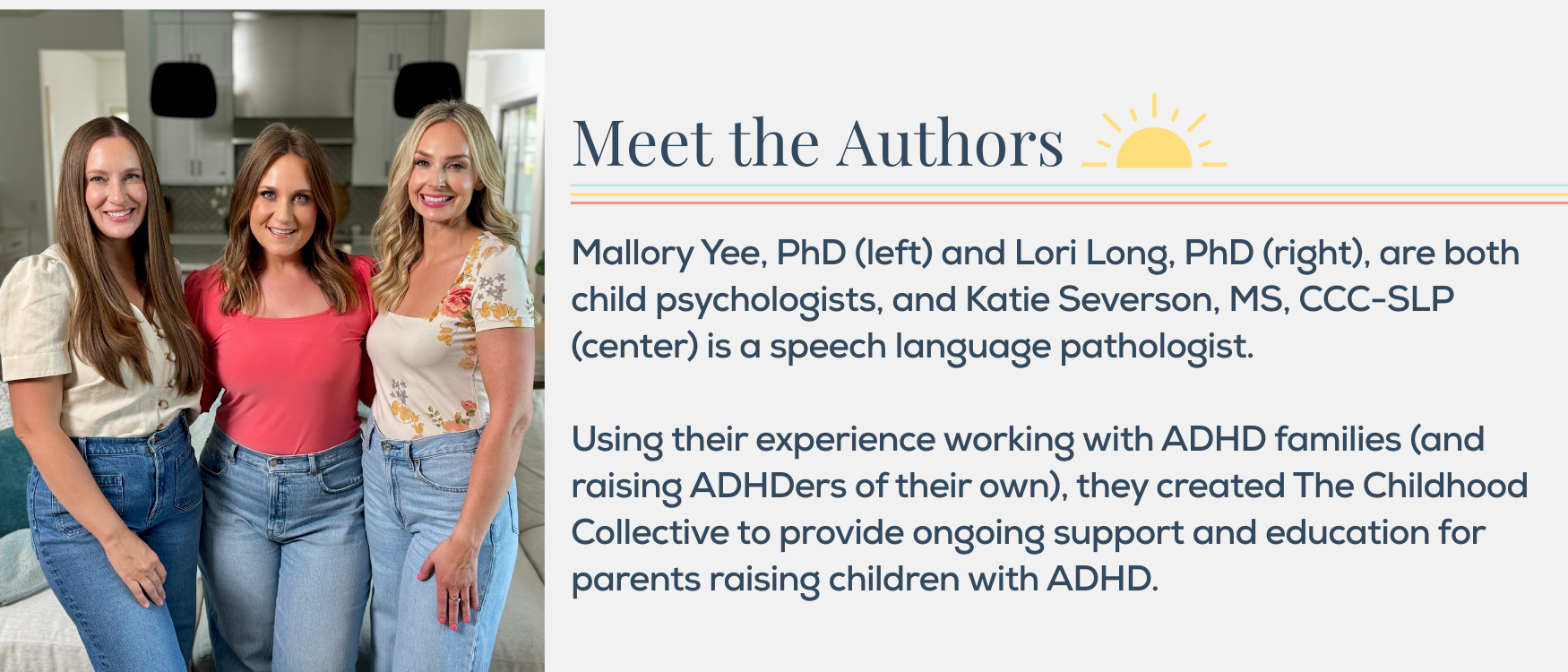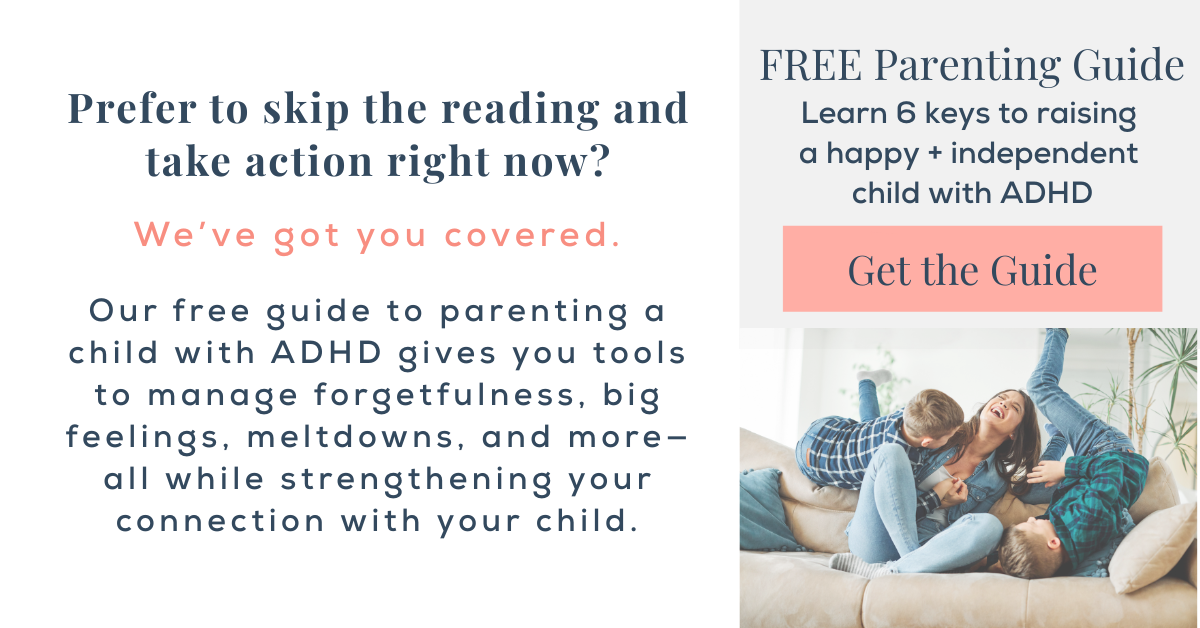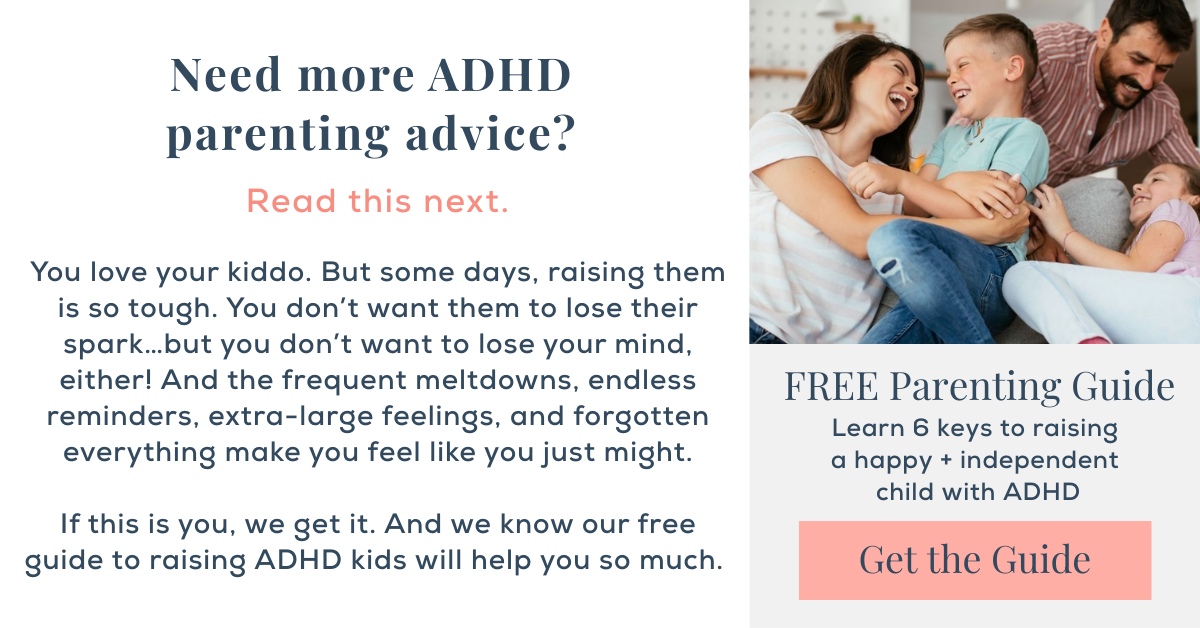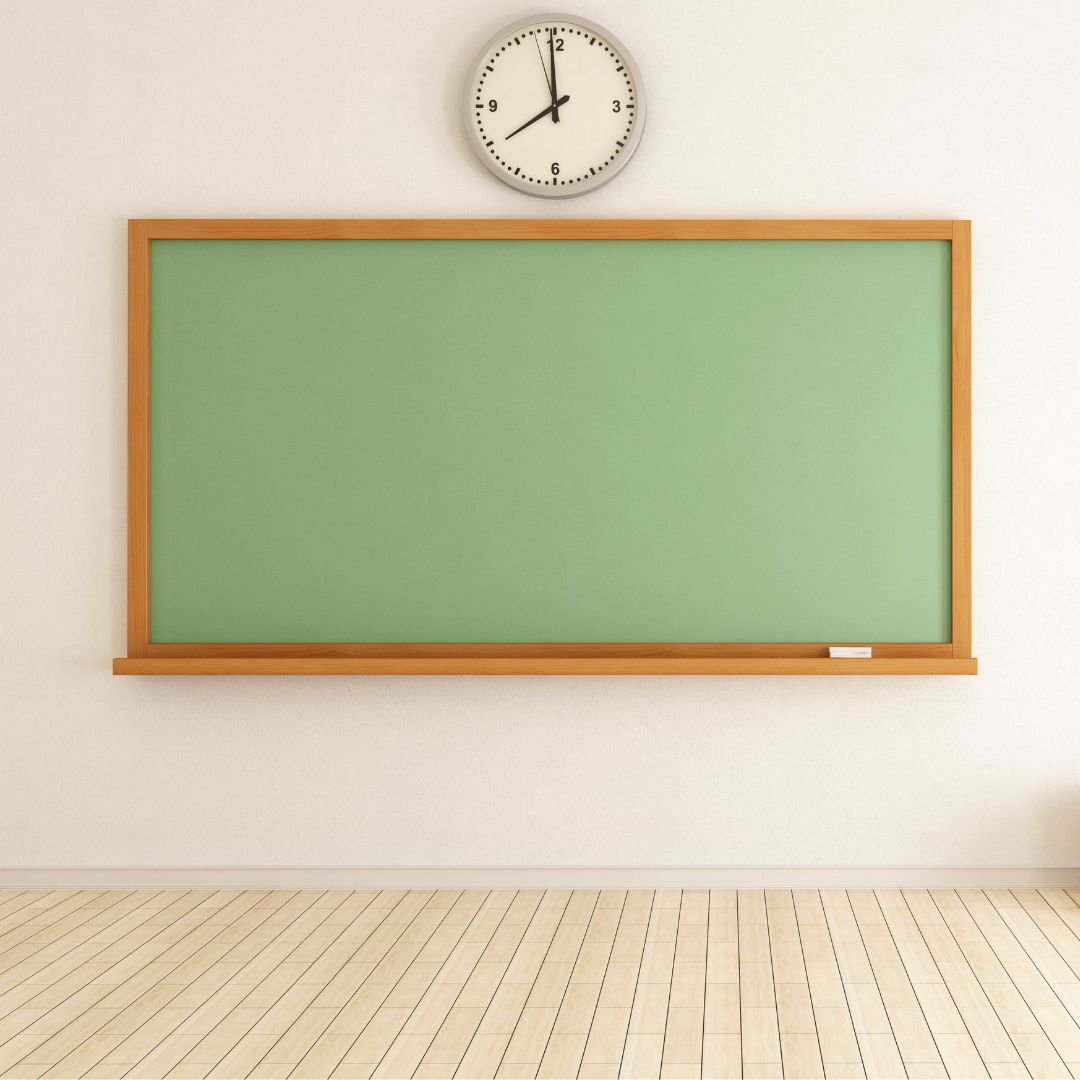Over the past few months, we’ve been sharing about executive function skills: what they are, why they’re so important, and how we, as parents, can support executive function development in our kids with ADHD.
Still, we consistently hear one (excellent) question from parents: “How do I know what executive function skills are appropriate for my child at their age?” We love this question because, when you’re not sure what your child should be able to do, it’s easy to expect too much or “over-help” them accidentally.
To help you understand what we would expect most kids to be able to do on their own at different stages, in this post, we’ve broken down the executive function milestones by age. So you can better understand the executive function skills your ADHDer has now, and which ones they may need your help to develop.
Note: This is the final post in a 3-part series on executive function and ADHD. Be sure to read Part 1 and Part 2 next (or first!).
Jump To The Answer You Need
Executive Dysfunction in Kids with ADHD
Executive Function Development
Executive Function Milestones by Age
How To Build Your Child’s Executive Function Skills
What Is Executive Function?
Executive functions are a set of brain-based skills that allow us to make decisions, plan activities, and stay focused while accomplishing our goals. The 9 skills that make up executive function are:
-
-
-
- Inhibition: The ability to stop ourselves from doing things we shouldn’t.
- Self-Monitoring: The awareness of how our actions impact others.
- Cognitive Flexibility: The ability to move between situations as needed.
- Emotional Control: Regulating our emotions to be appropriate for the time and place.
- Initiation: The ability to begin a task independently.
- Working Memory: The type of memory needed to hold small amounts of information in mind in order to complete a task. (Important for following multi-step directions and sustaining attention.)
- Planning: The skill of thinking ahead to manage future demands
- Task-Monitoring: The ability to check work as we go, ensure we’re on track, and complete tasks accurately.
- Organization: The ability to keep track of our own belongings and materials.
-
-
These executive functions guide us as we complete multi-step tasks, manage our schedules, and talk with friends. They also help us pay attention to a boring task, change plans when we need to, and stop ourselves from saying what we are truly thinking (when our true thoughts could get us in trouble).
Related article: Executive Functions in Everyday Life… And Why They Matter
Executive Dysfunction in Kids with ADHD
Consistently struggling with tasks that require executive function is referred to as “executive dysfunction” and is a hallmark of ADHD. So, if your ADHD child struggles regularly in many of these areas, that makes sense.
Executive dysfunction can look like:
-
-
- Leaving a mess behind them everywhere they go
- Having BIG feelings and resistance to daily chores and tasks
- Easily becoming distracted from tasks
- Needing near-constant reminders to get “simple” things done
- Overreacting to “minor” problems
-
It’s worth noting that everyone struggles with executive function-related tasks sometimes. But with ADHDers, executive dysfunction isn’t the exception—it’s typically the rule. (At least, until they get support to manage their symptoms!)
Related article: 5 Things All ADHD Parents Should Know About Executive Functions
Executive Function Development
Executive function takes years to fully develop—25 years, to be exact. And the executive functions all develop at different rates, from early infancy through adulthood. So, all kids struggle with executive function from time to time.
Toddlers have tantrums because they haven’t developed emotional control skills yet.
Preschoolers need reminders because they don’t yet have a great understanding of time.
Elementary schoolers get into trouble because they’re still learning inhibition and don’t always follow the rules.
These types of executive function-related struggles are age-appropriate and not necessarily a sign or result of ADHD.
Children with ADHD, on the other hand, struggle with executive function-related skills we would expect children of their age to have already mastered. So, as an ADHD parent, it’s worth trying to understand which of your child’s struggles are age-appropriate, and which ones are the result of true executive dysfunction.
To help you make this distinction, we’ve broken down the executive function milestones by age.
Executive Function Milestones by Age
Read through this list with your child (and their daily struggles) in mind.
→ If they struggle with any of the executive function milestones we’d expect a child of their age to have met…that’s likely a sign of executive dysfunction. In other words, they probably struggle with those skills because they have ADHD and may need more support to meet the milestones.
→ If they struggle with executive function milestones we’d only expect older children to have met…you can probably chalk that up to them being young. They could get there eventually, they just need more time.
A QUICK NOTE ON MILESTONES & DEVELOPMENT
Before we start, it is SO important to understand that every child is different! If your child isn’t ready for the “age-appropriate” tasks yet, that’s okay! Just drop back a level or two and meet them wherever they are.
Also, for the longer developmental periods (ages 6-11, for example), keep in mind that these skills are constantly developing. So, we would not expect a 7-year-old to be doing everything in that stage yet.
Executive Function Skills in Babies (6–12 months)
Babies between 6-12 months old are already developing executive function skills! They can’t self-soothe, so they practice emotional control by seeking comfort from familiar people. They use working memory as they recognize faces and express preferences for certain toys and activities, as well as attention as they track objects and watch the faces of people who engage with them. And, through cause-and-effect play, realize that their actions impact the world around them, which is the beginning of self-monitoring.
MOST BABIES CAN:
-
-
- Understand cause and effect. Introduce toys that pop up, move, spin, or make sounds when they shake them.
- Play games like Peek-A-Boo. Interactive games also help them recognize and respond to the emotions of those around them.
- Participate in feedings by turning their head toward the food and reaching toward preferred foods.
-
Toddlers are busy creatures! At this age, they explore the world and learn almost everything through play. As they learn to interact with the environment and people around them, they begin to experiment with problem-solving, use emotional control to better communicate their feelings, and protest more appropriately by inhibiting their reactions in different situations.
(Remember, these skills are emerging at this age—not being perfect. So tantrums, meltdowns, and big feelings are still completely typical.)
MOST TODDLERS CAN:
-
-
- Assist with simple self-care activities like brushing hair or getting a diaper.
- Follow simple one- or two-step instructions.
- Imitate others’ words, actions, and facial expressions.
- Look at books and attend to pictures.
-
Parent Tip: Reading to your child daily will improve your child’s executive function skills, including organization, attention, and emotional control.
Executive Function Skills in Preschoolers (3-5 years)
During the preschool years, the executive functions that relate to social interaction develop very quickly. Between the ages of 3 and 5, kids learn to negotiate, compromise, stand up for themselves, and persuade others to see their viewpoints. They can be very persistent when they really want something! They are also learning to keep their hands to themselves, wait their turn, and follow the group plan. All of these interactions help them hone executive function skills like emotional control, cognitive flexibility, inhibition, and self-monitoring.
MOST PRESCHOOLERS CAN:
-
-
- Participate in simple self-care routines.
- Put laundry in the hamper after changing clothes.
- Put shoes and toys away properly after using them.
- Set the table with kid-friendly dishes.
- Identifying and responding to others’ emotions.
- Help with cooking, by pouring or measuring items. (Keep in mind that the process is more important than the end result. If you are trying to make a perfect meal, this may not be the time to invite your child to help!)
-
Parent Tip: Kids love to know about “rules” at this age, so it’s a great time to introduce the concept of “everything has a place.” Teach your child that the hairbrush always goes in the top bathroom drawer, and jackets hang on a hook in the hallway. If you’re consistent at putting things in the same place (organization), they’ll learn to do this, too, making life much easier.
This is also a good age to start introducing visual routines, especially for those challenging parts of the day (think: hectic bedtimes and chaotic mornings). Our printable shop has beautiful, customizable routines you can print, personalize, and start using today.
Executive Function Skills in Elementary School (6-11 Years)
Children are quickly developing executive functions related to academic work at this age. As they’re exposed to literature and school-based concepts, they use working memory to recall and integrate information into their current knowledge. They use planning and organization to keep track of their things and manage their time. Through long-term projects or group work, they develop the skill of initiation, getting started on a task even if it isn’t motivating.
Task monitoring also emerges as children start to internalize time at this age and estimate how long things should take. And, socially, school-age they continue to develop emotional control and inhibition, which are much needed for successful social interactions.
MOST ELEMENTARY SCHOOLERS CAN:
-
-
- Complete multi-step tasks like cleaning a bedroom or sorting laundry.
- Manage homework and projects with support from parents. (As they reach 1st grade and beyond, children can use a calendar or planner to break tasks down.)
- Have increased independence in self-care routines like showering, bathing, and dressing.
- Gather materials for an event or project (e.g., soccer game, poster board presentation) and make sure they have everything they need.
- Inhibit of inappropriate behaviors at school (e.g. Raising their hands to speak.).
- “Go with the flow” and change plans as needed.
-
Parent Tip: Use timers to help your school-aged child internalize the concept of time. (Our go-to tool is The Time Timer)
Middle & High School (12-18 years)
During this stage, children rapidly develop their critical thinking abilities and learn to organize their days and manage their time. They develop cognitive flexibility as they understand several perspectives and manage competing tasks and priorities at school and during extra-curriculars. By middle school, children are expected to show inhibition and emotional control, follow the rules and respond appropriately to different situations. Task monitoring and planning become increasingly important as projects and assignments get longer and require more complex steps in order to complete the task. Teenagers are also expected to develop goals and initiate the steps to achieve them as they go through high school.
MOST MIDDLE AND HIGH SCHOOLERS CAN:
-
-
- Be expected to know the schedule and anticipate events (e.g., I have Karate every Monday).
- At the end of this stage, a senior in high school could manage their schedule somewhat independently (e.g., knowing what days they work and when to be home for dinner).
- Work with increasing independence by staying organized and planning for academic success.
- Solve problems and think critically. (During this stage, they’ll typically develop their own beliefs and world views, separate from yours.)
- As they near the end of this stage, teens will engage in less risky behavior as they are able to see the bigger picture. (But most teens still won’t understand long-term consequences the way adults do.)
-
Our free guide to parenting a child with ADHD gives you actionable tools for raising a happy and independent ADHDer—many of which directly support their executive function development. If you haven’t yet, grab your copy below.
How To Build Your Child’s Executive Function Skills
Remember, the human brain takes around 25 years to fully develop. So, even at 18 years, when our kids enter what we consider “adulthood,” the brain continues to develop…with the most notable developments happening in the frontal lobe, which is responsible for executive function.
A lot of progress can be made in the meantime, though! As we mentioned in part one of this series, many of the executive functions can be improved with quality intervention, practice, and patience.
Have a beautiful week,
Katie









[…] For Part 2 of our Executive Function series, click here. […]
[…] For Part 3 of our Executive Function series, click here. […]
[…] about executive function, including what the executive functions are, why they are important, what ages they develop, and concrete strategies parents can use to help improve their child’s executive function. […]
[…] child cannot (consistently) do something well that is outside of their developmental skill level. When children are presented with tasks day after day that are outside their skill level, they are […]
[…] is important, especially for children with ADHD (keep in mind that they often lag 30% behind their peers in executive functioning and other […]
[…] Executive Function Skills By Age – thechildhoodcollective.com […]